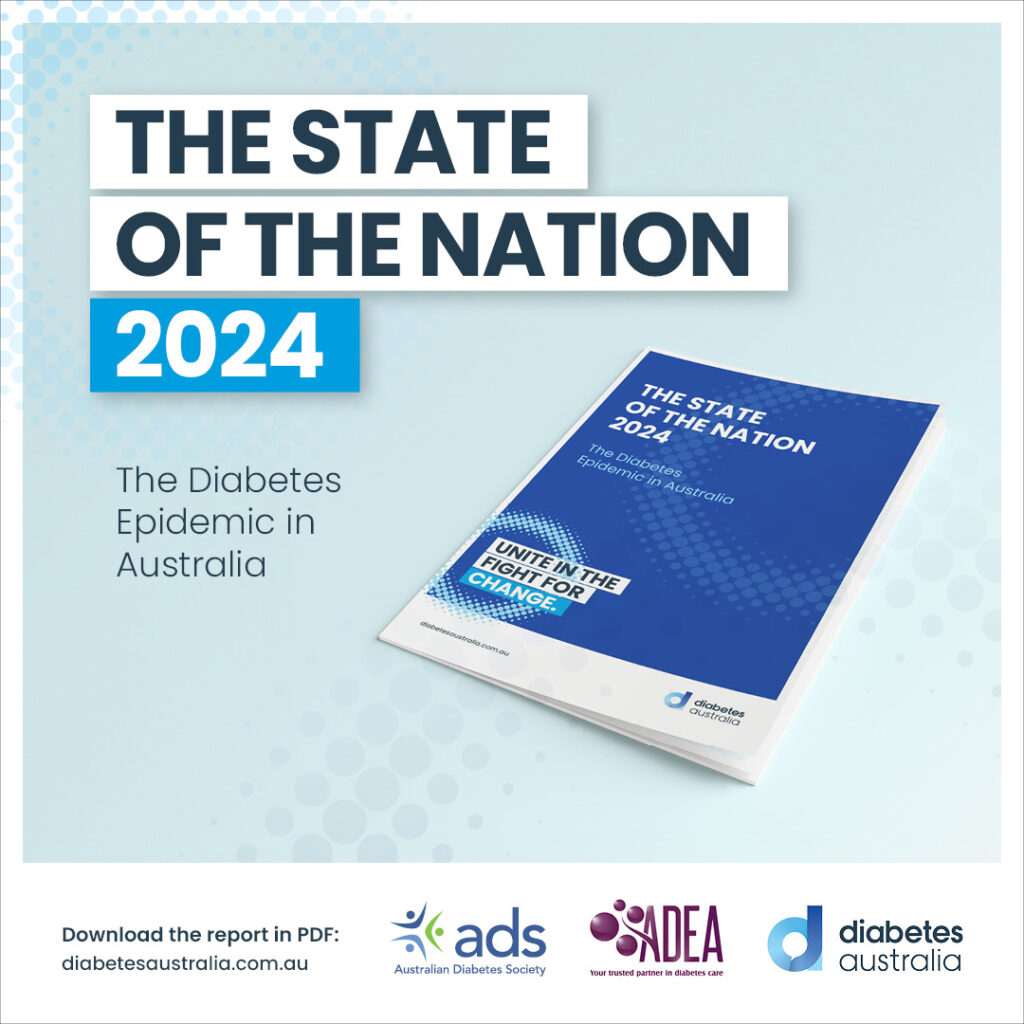Already a member? Click here to login.

Australian Diabetes Educators Association
Already a member? Click here to login.

Already a member? Click here to login.

Significant investments in expanding access to Credentialled Diabetes Educators (CDEs) and in strengthening the broader diabetes health workforce are major recommendations in a report released today by Diabetes Australia.
Launched at NSW Parliament, the State of the Nation 2024 report includes 25 recommendations, with nearly half of them focused on bolstering the health workforce to address the growing diabetes epidemic.
The report states that more than 300 Australians are diagnosed with diabetes daily and an estimated two million are currently living with the condition.
In the past decade, diagnoses among individuals aged 21–39 years have increased by 44%, and by 17% among those aged under 20 years. During this period, the number of people living with diabetes has grown by 32%, from about 1.1 million to nearly 1.5 million.
Key recommendations related to the diabetes health workforce:
ADEA CEO Susan Davidson said the report’s “many recommendations relating to the diabetes workforce echo ADEA’s advocacy about the urgent need for investment in this area”.
Ms Davidson said ADEA also supported the recommendation to expand subsidies for diabetes technologies to ensure affordability based on clinical need rather than diabetes type.
“Associated with that is remuneration for diabetes health professionals to support the optimal use of diabetes management technologies,” she said.
“We are proud to have provided expert advice to support the development of this important report.”
Diabetes Australia Group CEO Justine Cain said the lack of a national type 2 diabetes prevention plan was deeply concerning.
“Prevention is the only thing that will protect future generations of Australians from the costly impact of living with type 2 diabetes,” Ms Cain said.
The report comes at a critical time in the national conversation about diabetes.
With the unified organisations — ADEA, the Australian Diabetes Society, and Diabetes Australia — providing submissions and evidence to the Parliamentary Inquiry into Diabetes, which is expected to deliver its findings soon, Ms Cain said: “We need to see bold recommendations from the Parliamentary Committee that will help our country stem the tide of the diabetes epidemic”.
Other recommendations the report made include a 20 percent health levy on sugar-sweetened beverages, a national type 2 diabetes high-risk prevention program, and increased funding for diabetes research through the National Health and Medical Research Council.

Significant investments in expanding access to Credentialled Diabetes Educators (CDEs) and in strengthening the broader diabetes health workforce are major recommendations in a report released today by Diabetes Australia.
Launched at NSW Parliament, the State of the Nation 2024 report includes 25 recommendations, with nearly half of them focused on bolstering the health workforce to address the growing diabetes epidemic.
The report states that more than 300 Australians are diagnosed with diabetes daily and an estimated two million are currently living with the condition.
In the past decade, diagnoses among individuals aged 21–39 years have increased by 44%, and by 17% among those aged under 20 years. During this period, the number of people living with diabetes has grown by 32%, from about 1.1 million to nearly 1.5 million.
Key recommendations related to the diabetes health workforce:
ADEA CEO Susan Davidson said the report’s “many recommendations relating to the diabetes workforce echo ADEA’s advocacy about the urgent need for investment in this area”.
Ms Davidson said ADEA also supported the recommendation to expand subsidies for diabetes technologies to ensure affordability based on clinical need rather than diabetes type.
“Associated with that is remuneration for diabetes health professionals to support the optimal use of diabetes management technologies,” she said.
“We are proud to have provided expert advice to support the development of this important report.”
Diabetes Australia Group CEO Justine Cain said the lack of a national type 2 diabetes prevention plan was deeply concerning.
“Prevention is the only thing that will protect future generations of Australians from the costly impact of living with type 2 diabetes,” Ms Cain said.
The report comes at a critical time in the national conversation about diabetes.
With the unified organisations — ADEA, the Australian Diabetes Society, and Diabetes Australia — providing submissions and evidence to the Parliamentary Inquiry into Diabetes, which is expected to deliver its findings soon, Ms Cain said: “We need to see bold recommendations from the Parliamentary Committee that will help our country stem the tide of the diabetes epidemic”.
Other recommendations the report made include a 20 percent health levy on sugar-sweetened beverages, a national type 2 diabetes high-risk prevention program, and increased funding for diabetes research through the National Health and Medical Research Council.